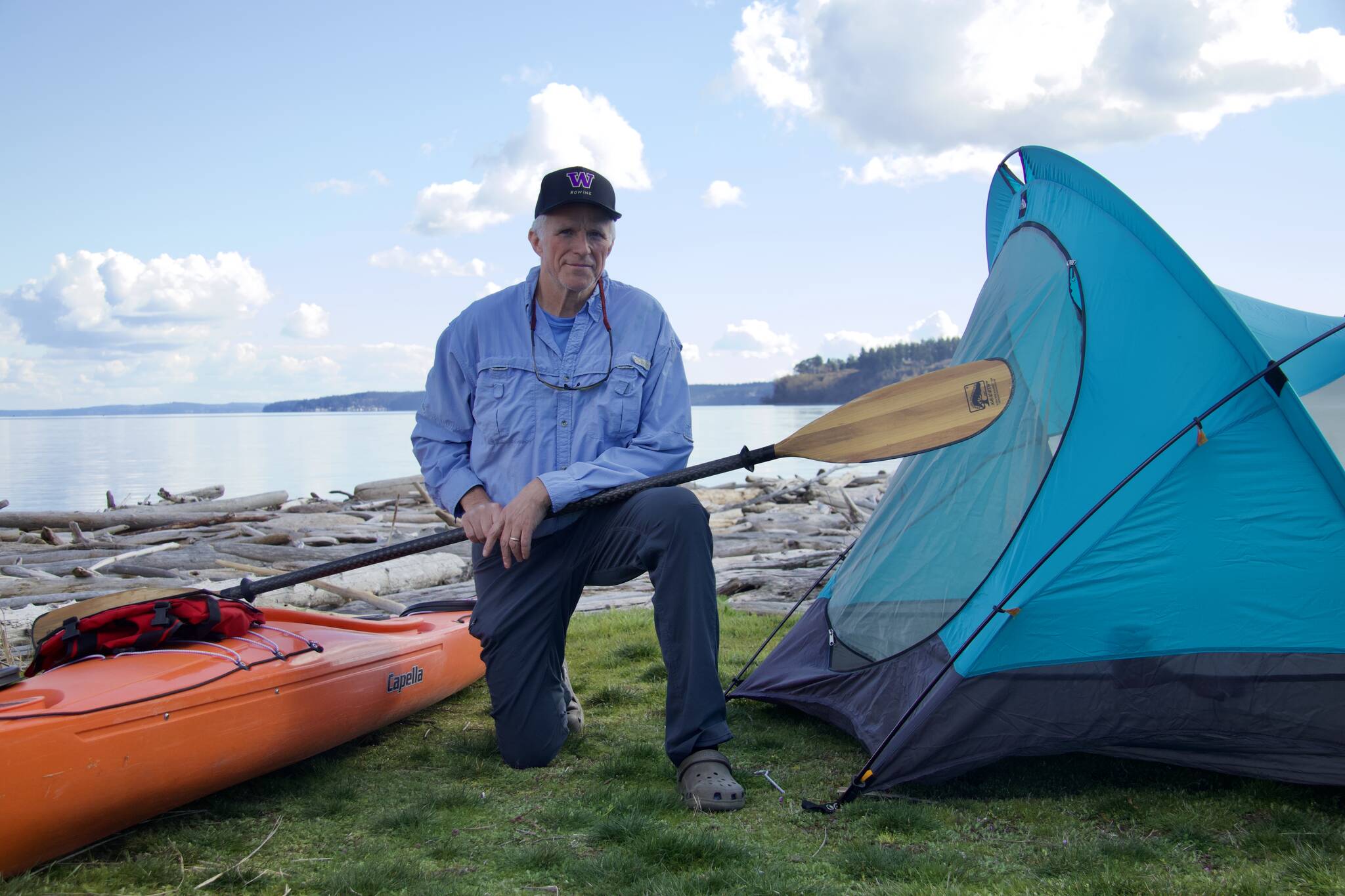There is a nondescript patch of grass near the water in Windjammer Park that, while it may not look like much, is actually part of something much larger.
It is a kayak campsite on the Cascadia Marine Trail, a 150-mile water trail in the Puget Sound with over 60 campsites that are accessible by kayak. The trail stretches from inlets near Olympia all the way to the Canadian border. Whidbey Island has five campsites on the trail where people who are kayaking from other water camp sites can spend the night.
The city of Oak Harbor has approved reopening the campsite, which was closed after the city council adopted an ordinance in May 2019 to ban all camping in city parks. Sabrina Combs, communications manager for the city, said that city staff recommended to the council that it include an exemption for kayak camping at Windjammer Park. The council approved an ordinance last year that recognized the long history of allowing non-powered boaters traveling on the Cascade Marine Trail the opportunity to camp, she said.
The Cascadia Marine Trail was established by the Washington Water Trails Association, a Seattle-based nonprofit. Andree Hurley, executive director of Washington Water Trails Association, said that board member and Oak Harbor resident Bill Walker was instrumental in reopening the Windjammer campsite.
“The city of Oak Harbor was amazing and it was a pleasure to meet the city manager, chief of police, port captain and various city council members, all thanks to Bill,” Hurley wrote in an email.
Walker, an avid paddler, has lived on Whidbey Island for 15 years and was in the kayaking business for about 10. He owned his own kayaking shop in Seattle. Walker advocated to reopen the site, something he is particularly excited about.
Walker said the unique thing about the Windjammer Park campsite is that it’s easily accessible to town on foot. For kayakers on a multi-day trip, it’s convenient to be able to walk to nearby stores to restock on food and other supplies.
“There aren’t very many of (the sites) that are even in a remotely urban environment,” Walker said. “So this is really great for the water trail.”
Debbie Skinner lives in a house that is only a stone’s throw away from the site. A kayaker herself, she is known to bring campers pastries and coffee in the morning.
“Whenever someone lands here, I always try to come over and greet them and say hello,” Skinner said, adding that she’s met people from all over the world. She said people have camped frequently at the site through spring and summer in years past.
Kayak camping requires a lot of gear and preparation to be done successfully, Walker said. It is, of course, similar to regular camping, except everything must be kept in a dry bag and stored in the kayak. He pointed out that there is more room in a boat than a backpack and kayakers would have to carry about 100 pounds of gear on a multi-day trip,. Paddling a heavy boat in rough water can be challenging, he said, and kayakers have to properly balance the weight in the boat.
Kayaking for days at a time also involves a lot of logistical considerations, especially for someone like Walker, who is passionate about water safety.
Walker stressed the importance of having proper safety gear and not simply relying on being rescued if something goes wrong. He said to always bring a waterproof VHF radio which allows communication between other boats, marinas and the United States Coast Guard. Knowing the correct channel calls to make on the radio will get help to you quicker, Walker said.
Krista Loercher, owner of Whidbey Island Kayaking in Langley, said people must have kayaking skills before attempting a kayaking trip. She thinks there are some great campsite options for people taking a one- or two-night kayaking trip on Whidbey Island.
She said the site at Windjammer Park offers great access for people who live on the island. The campsite is directly on the water, nearby a parking lot and does not require an extensive kayaking trip to visit.
“That’s what’s so great about the reopening of that site,” she said. “It’s giving access.”
Despite all of the precautions kayak camping involves, Loercher said it’s all worth it.
“It’s worth that trouble. It’s worth the opportunity to focus on your immediate needs and your safety,” she said. “That opportunity to be someplace that allows you to unplug and yet plug into yourself in an even deeper way.”
Walker shared a similar sentiment. He loves kayaking so much because being on a human-powered watercraft is “like being one with the water,” he said.
“There are so many things you hear and see and smell that you don’t get when you’re on a motorboat or even on a sailboat,” he said. “It’s so quiet and peaceful. I’ve had gray whales come up practically next to the boat.”
There are four other water campsites on Whidbey Island: Ala Spit County Park, Joseph Whidbey State Park, Fort Ebey State Park and Possession Point State Park. For more information on these sites and reservations, visit wwta.org/water-trails/cascadia-marine-trail.


